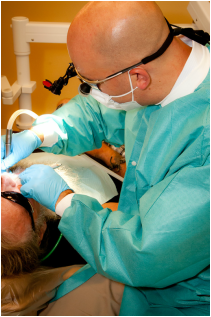Emergencies
|
|
Permanent (adult) teeth were meant to last your entire life, but sometimes an extraction can be necessary for the following conditions:
|
What Happens with Tooth Extraction When you come to see Dr. Willis, he’ll take x-rays to plan how best to remove the tooth. At that time, he’ll also request your medical and dental history along with list of all the medicines you take, both prescription and over-the-counter (including vitamins and supplements). The x-rays will show the relationship of your targeted tooth to your other teeth, sinuses, and nerves, as well as any infections, tumors, or bone disease that might be present.
After the x-ray, Dr. Willis will give you local anesthesia, so that the area around the tooth will be completely numb. Depending on the condition of your tooth, Dr. Willis will either remove it using an instrument called an elevator and forceps or perform a surgical extraction by making a small incision in your gum and then removing the tooth. Impacted teeth are always removed through surgical extractions. Once the extraction is over, Dr. Willis will ask you to bite on a piece of gauze for 20 – 30 minutes. The pressure will allow the blood to clot, but you can still expect some bleeding for the next 24 hours. Your tooth site may need to be closed with dissolving stitches. Do not disturb the blood clot by spitting, using a straw, or smoking after the extraction, as this can lead to dry socket, which is painful. |
Aftercare with Extractions Dr. Willis will give you instructions on aftercare. There will be some discomfort after the extraction, so you may want to take ibuprofen (Advil) according to the dose recommended on the bottle. If you are having a surgical extraction, Dr. Willis will likely prescribe pain medication. To reduce swelling, put ice packs on your face for twenty minutes at a time; if your jaw is still sore and stiff once the swelling goes down, try warm compresses next. You’ll want to eat soft foods at a moderate or cool temperature for several days, but try other food as your comfort level increases.
Be gentle in cleaning your teeth. You can keep the extraction site clean by doing a gentle rinse with warm salt water (1/2 teaspoon of salt in a cup of water) beginning the day after the surgery. If you have fever, redness, swelling, uncontrolled bleeding from the extraction site, or numbness in your tongue, chin, or lips more than four hours after the extraction, call Dr. Willis or contact the Creedmoor Family Dentistry office if it is after hours. |





